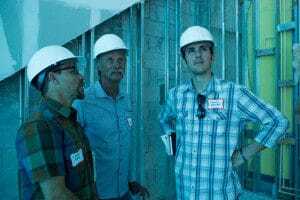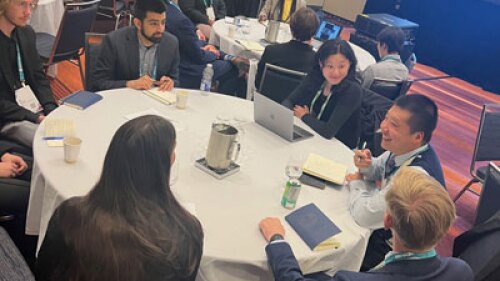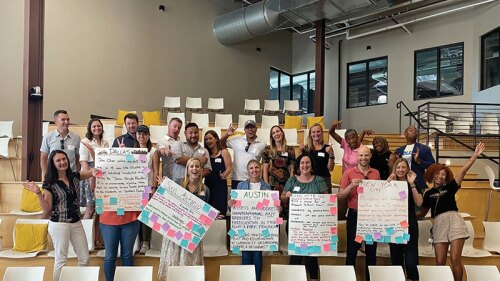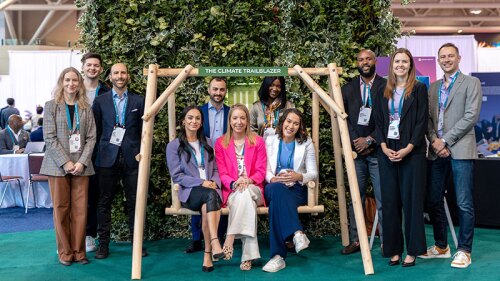Though Howard Kozloff always enjoyed attending ULI events, he thought an important topic was often missing from the conversation: the challenges faced by the small-scale real estate developer interested in transforming neighborhoods at the neighborhood level—literally lot by lot, block by block. Talk of global capital flows and billion-dollar deals tended to dominate panel and product council discussions, and these issues did not pertain to what Kozloff wanted to do with his real estate career.
Kozloff, owner of Los Angeles–based Agora Partners, found a kindred spirit in Jim Heid of Urban Green, a California-based consulting business focused on sustainability planning for private and nonprofit clients. Heid also had significant experience as a speaker, educator, and workshop leader for ULI’s CLUE (Climate, Land Use, and Energy) initiative, which evolved into the ULI Center for Sustainability.
In 2012, Kozloff and Heid teamed up to develop a series of programs geared toward ULI members who, like themselves, were independent entrepreneurs doing small-scale projects. They brought the idea to David Mulvihill, vice president of ULI’s Professional Development program, who was looking to create a new line of educational programs aimed at helping developers take their practice to the next level.
ULI’s Real Estate Entrepreneur Program kicked off with forums in San Francisco and Washington, D.C., in which those either interested in or already pursuing small-scale development were invited to learn from peers and share stories about successes and challenges. Subsequent forums have been held in Seattle, New Orleans, and most recently Miami, where participants took part in a study tour of small-scale infill development. Each forum draws familiar faces as participants find the community they have been seeking within ULI’s “big tent.” These gatherings tend to be intimate and conversational—with plenty of opportunities for peer-to-peer learning, networking, and informal exchange. The program has expanded its offerings to topic-specific seminars in different cities across the U.S. Recent topics included: creative financing, strategic planning for the small-scale developer, and attracting capital to your project (See box for a list for upcoming programs).
To Heid, the program harkens back to the early days of ULI, when many members were involved in small and family-owned enterprises.
“The real estate industry has largely been made up of entrepreneurs,” he says. “In fact, the entrepreneur program is really what the industry used to be like. What’s different about it now is that there is a consciousness of people who have entered the industry at this scale—that this is the level they want to operate on because they want to have a certain kind of impact, and that what they are doing is not simply a rung on a ladder to something bigger.”
Site—Not Product—Driven
What Heid and Kozloff found was that there was no textbook definition of small-scale development. Initially, they defined it in terms of dollar amount—$1 million to $25 million deals—but soon realized that the size of the deal was less important than a common attitude or philosophy of the developer.
“It goes back to a craftlike or an artisan approach to real estate,” Heid says. When Heid asked forum participants what motivated them to get out of bed each morning, “many talked about demonstrating positive change in their neighborhoods,” he recalls. “It had more to do with a values alignment than with project size. What we saw were people who were really passionate about their communities and viewed real estate development more as a community tool as opposed to just an asset play.”
Small-scale developers also tend to prioritize a particular site or location and its specific needs over a predetermined product type, gravitating toward infill development. The type of building they develop on the site must always fit into the greater context of a street or neighborhood and offer remedies to repair the urban fabric. The site itself may be plagued by infrastructure or environmental challenges, which the small-scale developer embraces.
“They are looking at neighborhoods, finding these sites, and saying to themselves, ‘You know what would be really good here?’” Kozloff says, “as opposed to someone who might say, ‘I do 100-unit apartment buildings. Where can I accommodate one of those?’”
Small-scale developers also need to be nimble and efficient in their approach. Unlike large-scale development companies, small-scale entrepreneurs do not have the cash flows required for lengthy entitlement, planning, or community engagement processes, Kozloff says. “You need to be flexible and quick because the margins on time, cost, and revenue are so much smaller,” he says. “There is much more of a direct link between cost overruns and revenues on the back end.”
There is also a greater sense of personal responsibility, particularly since most small-scale developers live and work in the community where they are seeking to build. They must constantly engage with active neighborhood or community groups. “It feels more like a personal contract,” Heid says. “You have to build confidence and trust over time.”
Being a small-scale entrepreneur may mean tighter margins, less room for error, and the increased stress of running your own small business, but the emotional payoff is high. “I enjoy the direct accountability,” Kozloff says. “The idea of being able to walk down the street and say, ‘Yeah, I did that,’ is gratifying.”
The sense of direct accountability and connection to a site resonates with David Wanzer, a small-scale developer in Oklahoma City who has completed several boutique residential, retail, and office projects. A member of ULI Oklahoma, Wanzer first encountered the Real Estate Entrepreneur Program through an advertisement for the small-scale developer forum in Seattle in 2013.
At the time, he was an architect dabbling in real estate development and was interested in connecting with others who were interested in adaptive use of historic properties, cultivating community through thoughtful tenant selection, and “adding to the urban fabric in a fine-grained way.” Wanzer credits the Seattle forum with changing the course of his career and still refers to notes he took during the sessions. Each year, he returns to the forums and has signed up for online courses to shore up his pro forma modeling skills.
“It’s very collaborative and based on sharing,” he says of the forums. “People on the panels talk very openly and honestly. It’s hard to go up there and expose the pitfalls and the pro forma of a project. The fact that you’re around peers from other cities is a real strength of these conferences.”
And despite their expectation that they would attract mostly early-career professionals to the program, Kozloff and Heid have been pleasantly surprised by the diversity of backgrounds and experience levels. “The bigger cross section you have, the better your peer group becomes,” Kozloff says. “You have a lot of different voices and different perspectives trying to achieve different things.”
Ripe Opportunities as Cities and Neighborhoods Redevelop
At a time when small-scale development is attracting entrepreneurial types, urban neighborhoods are entering new phases of redevelopment, particularly as millennials and other demographic groups gravitate to the urban cores and other centrally located neighborhoods.
Andrew Frey, a Miami-based small-scale developer who has been involved in the Real Estate Entrepreneur Program from its inception, sees ripe opportunities for small-scale developers as increments or pools of capital become available—although raising capital for smaller projects continues to be a challenge. In densely developed cities like Miami, the number of large parcels or greenfield sites are finite, “while there are tons of urban parcels waiting to be developed or redeveloped,” he notes.
Ultimately, consumer demand is what will enable small-scale developers to define their niche and succeed, Frey says.
“People want new ways of living,” he explains. “There are plenty of single-family detached homes and plenty of high-rise condos. But people are looking for something in between—new forms of urban living in high-density, mixed-use, convenient, culturally rich neighborhoods that we haven’t yet begun to explore.”




